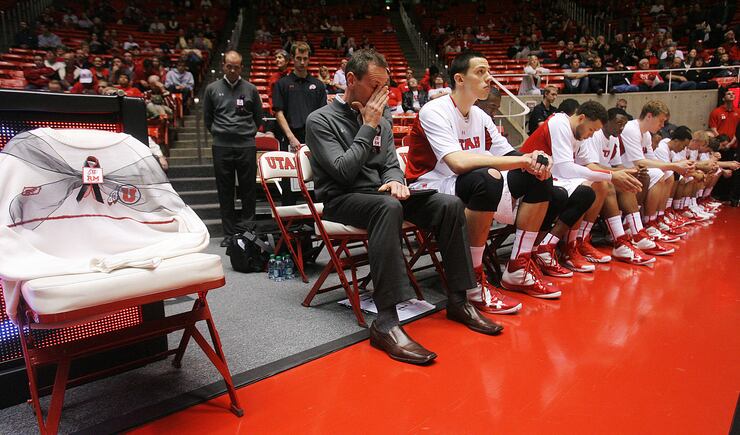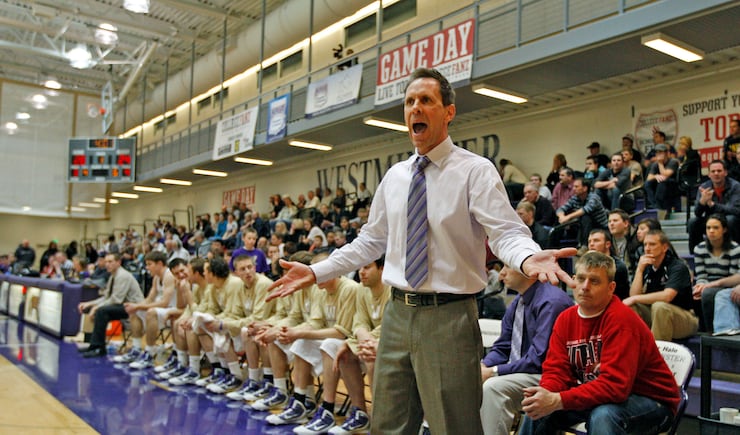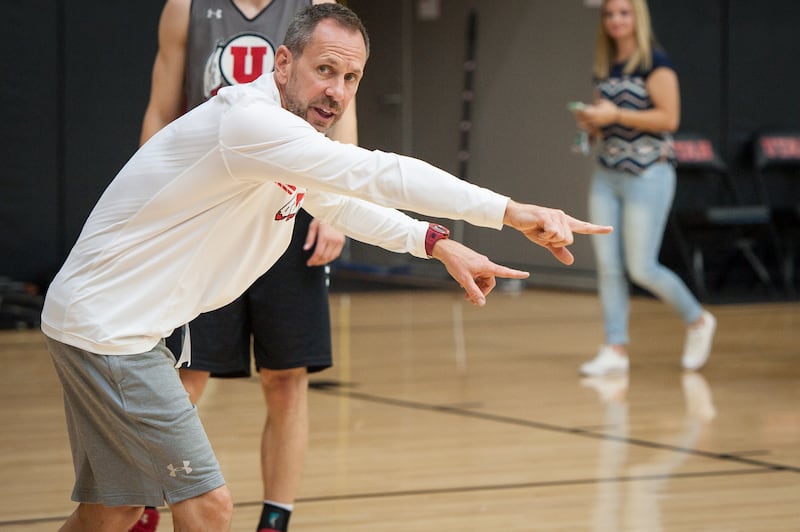It’s easy to overlook Tommy Connor. He’s always in the background, part of the furniture. If college basketball gave out Oscars, he’d win best supporting actor in a coaching role. During his two decades at Utah, Connor has been The Sidekick. He’s currently Larry Krystkowiak’s longtime sidekick. Before that, he was Rick Majerus’ sidekick. During his playing career for the Utes, he was Josh Grant’s sidekick.
Even in his childhood, Connor was The Sidekick. The youngest of five children, he arrived seven years after the next oldest, and followed his big brothers and his coach/father on and off the court.
So here he is, having spent a total of 21 years at the U., four as a player, three as a graduate assistant, four as an assistant coach under Majerus, and now 10 years as an assistant under Krystkowiak. A few years ago they gave him a promotion to assistant head coach, the ultimate Sidekick rank.















It’s not that he hasn’t had opportunities to be a head coach. He was the head coach at Westminster, a small college just three miles from the University of Utah campus, for 12 years, sandwiched right in the middle of his stay with the Utes. Since then he has had other offers to be a head coach. But every decision he made about such matters was based largely on one thing: family.
Coaching is in his blood. There was never any doubt about what he would do for a living. His father Bus was the head coach at Boise State for seven years during the ’70s. All three of his older brothers would play college basketball (Tommy would be the fourth). The gym was Connor’s second home. During halftime of his father’s games, the kid would run onto the court and launch shot after long shot while the crowd cheered. There were no dancing performers in those days and the Connor kid became the halftime entertainment by default.
He was more than a casual observer at practices and games even as a boy. He paid attention to what was happening and why. Connor was 7 or 8 years old when he began watching his father’s game films from the previous night. Other kids were watching cartoons on Saturdays; he was watching the full-court press and zone defenses. He had to thread film into reel-to-reel projectors and then work the pause and reverse buttons. He didn’t know it, but his preparation for coaching had begun.
Bus Connor was friends with Lynn Archibald, Utah’s coach at the time, and his youngest son signed to play for the Utes. Connor was a four-year starter for them and along the way earned a degree in exercise and sport science. Majerus became the head coach in time for Connor’s senior year. Majerus was brutally honest and demanding with players — even cruel at times — but he had one weakness: Connor. He was the teacher’s pet, while Josh Grant, the team’s star, was his favorite whipping boy.
“I was one of the lucky ones,” says Connor. “At times I felt guilty. He took out his frustration on Josh. Josh used to say to me, ‘Why doesn’t he get on you?’ I was a coach’s kid and played that way, and Majerus liked that. I played like a coach on the floor, getting the ball to the right people at the right time and being an extension of the coach. I was never a big scorer.”

As soon as his playing career ended, Connor was retained by Majerus as a graduate assistant and later as an assistant coach. Majerus took him under his wing. He made him his right-hand man. They worked closely together, spending long days and nights side by side, breaking down video, diagramming plays and game-planning. Talk about a resume builder.
Majerus was the talk of college basketball. He willed the Utes into becoming one of the top programs in the country and was widely considered a coaching genius. His game prep was obsessive and detailed — he’d yell at a kid if he set a pick with his feet five inches from his opponent instead of three — and his game-time adjustments were brilliant. Connor had caught a big break starting his coaching career with this guy. It was bound to lead to other great opportunities.
Then Connor quit.
‘Leap of faith’
Connor was working around the clock for Majerus, arriving early in the morning and getting home late at night, sometimes long after midnight. Majerus was a bachelor, but Connor had a wife, Kathryn, and then they had their first child, Jake. During the next year, Connor saw little of him.
“As everyone says, kids change your perspective,” says Connor. “Those seven years with Rick were hard. Most importantly, I didn’t want to continue on that path where I wasn’t involved in my kids’ lives. It was not an easy decision … I told coach Majerus, ‘I know I’m going to coach somewhere, but I’ve got to see my son.’”
He not only gave up the opportunity of a lifetime for a young coach, he quit without having another job waiting for him.

“It was a leap of faith,” he says. “It was a huge life decision. Kathryn was very supportive. My dad wasn’t sure about it. He later admitted he was wrong.”
He was unemployed for a year. The Connors survived on Kathryn’s work as a physical therapist. That year the Utes advanced to the national semifinals and then the national championship game (“I would have loved to have been on the bench for those two games,” he says. “At least I had really good seats. Majerus took good care of me.”)
Connor finally landed a job, but not as a coach. He was hired as director of a basketball facility in Orem, requiring Connor to make a daily 45-minute commute from his home in Salt Lake City. After working there a few months, he learned that Westminster College was going to start a basketball program. The demands of coaching at an NAIA (small-college) school were a fraction of what they were at a Division I school, especially one under Majerus.
Return to the bench
Connor got the job. He was given a year to organize the program before the team actually played games. He did everything, right down to ordering uniforms and recruiting an entire team. In 11 seasons under Connor, the Griffins won at least 20 games 10 times, collected seven conference championships and qualified for the NAIA national tournament nine times. He had traded coaching in the 15,000-seat Huntsman Center for coaching in a tiny gym at Westminster in front of 100 fans, if it was a good night, but he was able to be home with his family, which grew to three children.
“My young kids loved it — they were running around under the bleachers,” he recalls. “I’ve never looked back and had any regrets. Quite the contrary. I loved every minute I spent at Westminster College, coaching, teaching, playing in multiple NAIA national tournaments and most importantly having more time to spend with my kids. My family traveled on some bus trips, Jake would get his ankles taped with the players before the game … incredible experiences and memories.”

And then, as if on cue, when the Connor kids were older, the Utes called again. Krystkowiak became the Utes’ new head coach in 2011. He had never met Connor but the latter came highly recommended. He hired him as his assistant. As fate would have it, Jake joined the Utes three years later as a walk-on player.
“It all came full circle; I saw him for four years every day,” says Connor, who has managed to spend his entire 30-year coaching career in one city in a profession of nomads, allowing his family to establish roots. Two of his children have graduated from Utah and another is a sophomore there.
Back on the Hill
Connor made it clear that he didn’t want to return to the Utes if it meant late nights at the office and obsessive hours. Krystkowiak was already of the same mind.
“I never thought you needed a mattress in the office and that was an indication of how hard you worked,” says Krystkowiak. “Tommy works smart and efficiently. That’s all I’ve told our guys. I’ve got five kids too. I don’t want this to be a grind where you don’t feel comfortable. … If you’re putting in so much that you’re losing sleep, it doesn’t say much for efficiency and time management.”
“I never thought you needed a mattress in the office and that was an indication of how hard you worked. Tommy works smart and efficiently. That’s all I’ve told our guys. I’ve got five kids too. I don’t want this to be a grind where you don’t feel comfortable. … If you’re putting in so much that you’re losing sleep, it doesn’t say much for efficiency and time management.” — Larry Krystkowiak
Connor, who reportedly was interviewed for the Utah State head coaching position in 2015, would seem to be an ideal candidate for a Division I head coaching job, given his long, successful apprenticeship. Utah actually struck an official arrangement with Connor as the school’s head coaching in waiting, designating him as Krystkowiak’s replacement if the latter ever left the school.
In 2019 it was reported that the deal had been rescinded months earlier in the wake of an NCAA investigation, among other sanctions against the coaching staff, but this seemed more about placating the NCAA than a condemnation of Connor. Utah athletic director Mark Harlan threw his support behind Krystkowiak and his staff, saying at the time, “ … there’s a big difference between inadvertent mistakes and perhaps some of the other things we’ve seen in the country.”
Harlan termed the violations as “recruiting violations centered on a misreading of the NCAA calendar and a misinterpretation of the official visit limitations.” Krystkowiak reported the violation when he realized the error and the school released a statement stating, “the calendar oversight resulted in Utah coaches visiting a prospect at his high school during a period when in-person, off-campus recruiting was impermissible.”
Such an indiscretion will not impede Connor’s candidacy as a head coach somewhere.
“He’s one of the first people I’d look at if I were making that decision,” says Krystkowiak. “He’s had opportunities to leave Salt Lake but he’s been happy to keep the family intact. Now some of that is past. (Other schools) would be dumb not to consider him. He’s got such a great basketball mind. He’s unbelievably cerebral when it comes to the game. I’ve learned a great deal from him.”
If Connor is thinking about climbing the coaching ladder, he isn’t letting on.
“I don’t really look that far ahead,” he says. “That’s how I operate. I don’t even know who we play next week. I’m wired into the moment. I want to be as good as I can be and help those around me. … That doesn’t mean I don’t want to be a head coach someday. If the opportunity came about, I’d be interested. But I’m very happy with my role at Utah.
“Larry does a good job of allowing (his assistants) to flourish in their roles. He allows me to coach on the floor a lot in practice and in games and game prep. I’m able to work with players. I’m allowed every day to have an opinion and have a voice that’s heard and implement things that help our program. And that’s not necessarily the case in college athletics. We (assistants) all have a voice and credit Larry for allowing it. Larry has given me great responsibility and I’m very fulfilled as a coach.”
So Connor continues to work in the background, content as the sidekick but open to possibilities now that his family is raised. “He’s the quintessential team guy,” says Krystkowiak. “He’s not ego driven.”

















